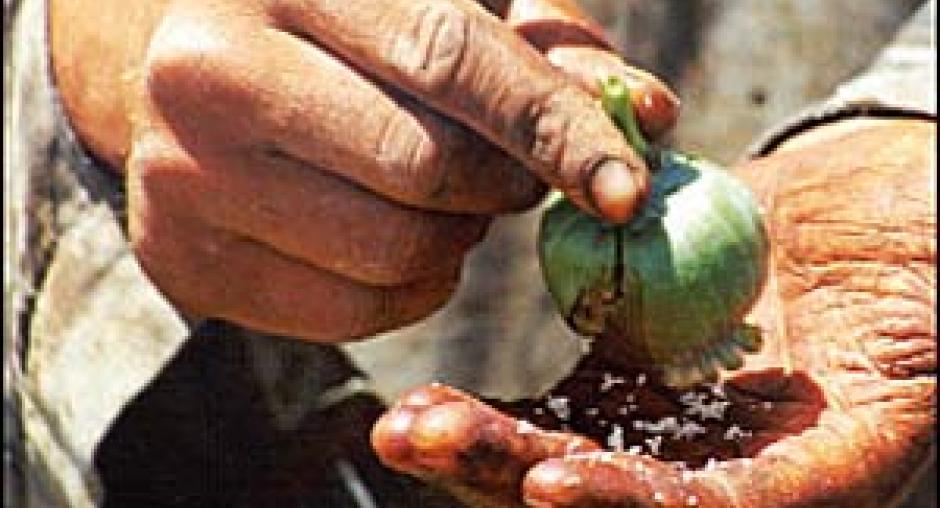Newsroom
OSCE, UNODC Vienna workshop focuses on combating illicit drug threat
VIENNA 24 October 2006

(Photo Courtesy UNODC)There was a 59 percent rise in 2006 of opium cultivation in Afghanistan. The area under opium cultivation has reached a record 165,000 hectare in 2006 compared with 104,000 in 2005. (Photo Courtesy UNODC) Photo details
VIENNA, 24 October 2006 - Experts from the OSCE and the United Nations Office on Drugs and Crime (UNODC) will discuss the role of international co-operation in combating illicit drug trafficking at a meeting that began in Vienna today.
The two-day event, 'Combating the Threat of Illicit Drugs in the OSCE Area,' brought together representatives of the 56 OSCE participating States and other international organizations, as well as OSCE Mediterranean and Asian Partners for Co-operation, including Afghanistan.
""The OSCE can help advance international co-operation in combating illicit drugs, assist governments in ratifying international legal instruments and provide political backing to initiatives from other specialized international organizations," said Ambassador Marc Perrin de Brichambaut, OSCE Secretary General.
"In recent years, the international community has developed important legal tools to fight the illicit drug trade, money-laundering, trans-national organized crime and terrorism. But they are of little use to the OSCE participating States affected by drug trafficking unless these States ratify them, transcribe them into their local domestic laws, effectively apply them and then initiate them and put them into practice."
Experts at the workshop pointed to the alarming 59 percent rise in 2006 of opium cultivation in Afghanistan, largely due to a dramatic increase in the southern provinces. The area under opium cultivation has reached a record 165,000 hectare in 2006 compared with 104,000 in 2005.
They also said that better regional information collection and sharing, risk profiling and analysis were needed, as well awareness-raising activities to expose the latest data and trends in Afghan opium poppy cultivation and trafficking, and the consequences of drug abuse - the growth of HIV/AIDS epidemics in countries neighboring Afghanistan and in Europe.
The Paris Pact Initiative, which aims to counter illicit traffic in Afghan opiates, was noted as a good example of international co-operation. The UNODC-led initiative has united practitioners and experts from source, transit and consumer countries to jointly discuss, identify and promote concrete measures to counter the increasing levels of heroin trafficked from Afghanistan.
Countering the production of and the trafficking in illicit drugs is part of the broader effort undertaken by OSCE States to combat organized crime, a priority for the Belgian OSCE Chairmanship.
The workshop was organized on the basis of a decision taken at last year's Ministerial Council in Ljubljana.
The two-day event, 'Combating the Threat of Illicit Drugs in the OSCE Area,' brought together representatives of the 56 OSCE participating States and other international organizations, as well as OSCE Mediterranean and Asian Partners for Co-operation, including Afghanistan.
""The OSCE can help advance international co-operation in combating illicit drugs, assist governments in ratifying international legal instruments and provide political backing to initiatives from other specialized international organizations," said Ambassador Marc Perrin de Brichambaut, OSCE Secretary General.
"In recent years, the international community has developed important legal tools to fight the illicit drug trade, money-laundering, trans-national organized crime and terrorism. But they are of little use to the OSCE participating States affected by drug trafficking unless these States ratify them, transcribe them into their local domestic laws, effectively apply them and then initiate them and put them into practice."
Experts at the workshop pointed to the alarming 59 percent rise in 2006 of opium cultivation in Afghanistan, largely due to a dramatic increase in the southern provinces. The area under opium cultivation has reached a record 165,000 hectare in 2006 compared with 104,000 in 2005.
They also said that better regional information collection and sharing, risk profiling and analysis were needed, as well awareness-raising activities to expose the latest data and trends in Afghan opium poppy cultivation and trafficking, and the consequences of drug abuse - the growth of HIV/AIDS epidemics in countries neighboring Afghanistan and in Europe.
The Paris Pact Initiative, which aims to counter illicit traffic in Afghan opiates, was noted as a good example of international co-operation. The UNODC-led initiative has united practitioners and experts from source, transit and consumer countries to jointly discuss, identify and promote concrete measures to counter the increasing levels of heroin trafficked from Afghanistan.
Countering the production of and the trafficking in illicit drugs is part of the broader effort undertaken by OSCE States to combat organized crime, a priority for the Belgian OSCE Chairmanship.
The workshop was organized on the basis of a decision taken at last year's Ministerial Council in Ljubljana.
